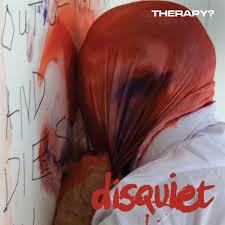"It really fucks me off," said James Dean Bradfield in a 2009 interview, "people get written out of history." He was talking about Therapy?, who may have dropped off your radar unless you’re a Welsh lead singer, a certain arrestedly-developed website hack or a Belgian festival promoter.
Via the dapper shirts, nice trainers and orchestral anthems of the Everything Must Go era, Bradfield’s own band, Manic Street Preachers, managed to avoid that same fate and would spend the rest of their days attracting Godlike Genius awards, prestigious songwriting prizes and frequent Q Magazine cover features. They never looked back and now they’re a bona fide, occasionally subversive if often tedious, British Institution with their own Louis XIV-style statue in Cardiff city centre (TBC).
While the Manics chose to hitch a ride on the mainstream Britpop scooter, Therapy? took one look at its mod roundels and Roger Daltrey stickers and decided they’d rather take their chances floundering in the lay-by gravel. Already heavier and weirder than Bradfield & co., Therapy? changed their sound too, but in a very different direction. And then kept changing it. They also refused all other bandwagon options and, even more anti-commercially, practically disowned their own most successful album, 1994’s mega-unit-shifting pop-metal masterpiece Troublegum. Next was the unsettling, gothic Infernal Love in 1995, after which Therapy? would lose one of their own original members, albeit in less tragic circumstances than the Manics did (drummer/vocalist Fyfe Ewing quit after IF’s gruelling tour). They followed this with 1998’s Semi-Detached, which did have a catchy single, ‘Church Of Noise’, which was even performed on Britpop showcase du jour TFI Friday with the band dressed in the kind of neat, non-metal outfits that suggested their Manics pals had taken them shopping at The Gap or possibly Asda.
There were, however, no overblown symphonies (Therapy?, to their credit, preferred to stick to a single cello) or uplifting sing-along hymns to blue-collar alcoholism. Conceived as a simple back-to-basics garage rock album, Semi-Detached span out of control as its makers coated it in layers of wonky guitar tracks, obscure samples and fuzzy noise. Lyrically, it had OK Computer-levels of anxiety and pessimism about London sinking into the Thames, "pigs-ear people, all dead in their droves" and suicidal fat kids. Sung by a scary-voiced Northern Irish chap rather the angelic Thom Yorke, none of its tunes made it onto a Baz Luhrmann soundtrack. The album wasn’t even released in America, Therapy?’s record label (A&M) folded, and thereafter they forged their own independent, idiosyncratic, anti-repetition path with raw rock records that even fewer people cared for. And all this time they seemed determined to escape Troublegum, to never repeat it, no matter what the consequences. They still played its tracks in their sets but would talk derogatorily of their biggest-selling album in interviews and generally roll their eyes if asked about it too much.
So it is surprising to learn that (to pinch Simon Price’s words on the last Manics album) they’ve done it. At last, they’ve actually gone and done it. Twenty-one years later, Therapy? have finally written a sequel to Troublegum. Did playing the album in its entirety last year make them more at ease with their past? Are they sick of people nagging for its follow-up? Have they got mortgages to pay off? Why try to pen a follow-up to an untouchable album against which this new one cannot possibly compete? Perhaps James Dean Bradfield lent them a copy of his own Holy Bible sequel, Journal For Plague Lovers, and went, "look, it ain’t genius but it’s not entirely worthless either. By the way, have you read Joseph Heller’s Closing Time? It’s actually not that bad…"
Eschewing the more experimental work of their last couple of LPs, Disquiet is full of glum verses leading to big, catchy, accessible choruses. It also shares certain lyrical themes with Troublegum and there are echoes of earlier tracks and even call-backs to certain riffs. ‘Insecurity’, for example, is practically a mash-up of ‘Trigger Inside’ and ‘Isolation’ and with its Helmet-y guitar and hip-hop-influenced drum patterns ‘Helpless Still Lost’ unashamedly resurrects the sonic tricks of ‘Unbeliever’. Through further cheerily-titled tracks such as ‘Still Hurts’ and ‘Torment Sorrow Misery Strife’, the anger, bitterness and shame are still present but Troublegum’s protagonist is now older and wearier. He’s developed tinnitus, thick nose hair and back ache; less "can hide the knives" than "can’t hide the sighs." Disappointment, failure and mortality loom large. "Trust us to fuck it all up, to fuck it all up when we get near the top," laments Cairns on ‘Idiot Cousin’ and, whereas the bleakness of Infernal Love ended on a strangely positive note with the refrain "there is a light at the end of the tunnel", Disquiet’s final track confronts the sadder reality that "the road ahead looks shorter than the one behind." This closing seven-minute dirge is based around a riff that asks, "what would Arctic Monkeys’ ‘Do I Wanna Know’ sound like if it suddenly found itself flicking through retirement home brochures?" Is Cairns writing his own epitaph here? Is this the end of Therapy??
It is a slight shame about Disquiet’s fudgy production. Therapy?’s post-punk basslines, lumbering riffs, tight-skinned drumbeats and piercing outro feedback deserve greater crispness. The record sounds muddy but not in that furious, amateur-industrial style of the band’s earliest mini-albums. Here the instruments muddle together foggily and somewhat awkwardly. Fortunately, the songs themselves are strong enough to be of great comfort to those who felt lost twenty years ago and found some degree of solace in Troublegum. And particularly by those of us who still feel lost today. They’ll always be in our history, James. Whatever happens.
<div class="fb-comments" data-href="http://thequietus.com/articles/17501-therapy-disquiet-review” data-width="550">


